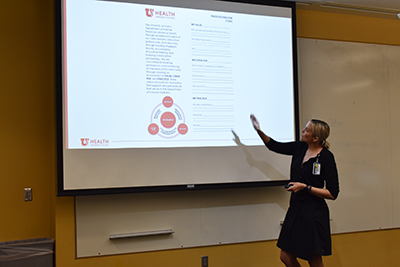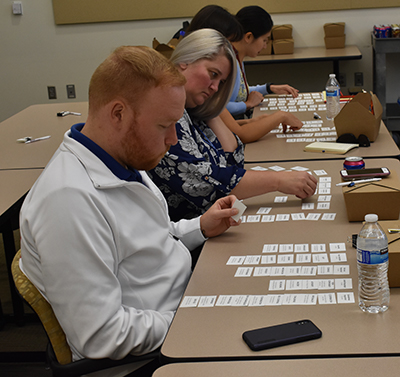Professionalism Enrichment Committee Update & Call for Volunteers
In May 2019, four Department of Internal Medicine employees sent out a call for volunteers to address workplace incivility and its impact on environmental wellness. A collective group of faculty, advanced practice clinicians, and staff answered that call and formed the Professionalism Enrichment Committee. Since its creation, the committee has met to create a Code of Aspirational Professionalism. This code will actively raise and maintain awareness of professionalism and respect, and establish an improved culture through the department.

At its first meeting in June 2019, committee members defined what workplace incivility looks and feels like and learned about the associated financial cost of workplace incivility, Using a study by Christine Pearsons and Christine Porath, authors of “The Cost of Bad Behavior: How Incivility Is Damaging Your Business and What to Do About It”, the Wellness Champions calculated the cost of bad behavior in the Department of Internal Medicine, a loss of nearly $13 million if 50% of department employees experience one incident of workplace incivility per year. While financial issues with workplace incivility are evident, the idea to form the Professionalism Enrichment Committee was based on various feedback from employees.
“The Professionalism Enrichment Committee was formed as a direct result of our department’s Waggl data, and from discussions heard at our various World Café events the past year,” says Aaron Bell, Director of Finance and Operations and a Wellness Champion. “Both the Waggl and World Café data shows us a need to address this issue, but we realized that a Code like this would need to be peer-driven. So we turned to our peers – the employees in our department who have experienced workplace incivility first-hand and want to make our department a better, more professional place to work.”
When the committee reconvened in August 2019, discussions centered on values, how they influence our behavior, but also how our values should reflect the Code of Aspirational Professionalism. Committee members participated in a value card sort activity in which they identified personal values that ranged from most essential to least important. “Though they’re different, we all have values and it’s fascinating to see that while they differ, our individual values drive who we are and what we do,” says Dori Knight, Faculty Program Manager and Wellness Champion. “The diversity of values, experience, knowledge, and background is what we need to think about when addressing workplace incivility. We need that diversity and collective voice of our employees to shape and influence this project.”
“Though they’re different, we all have values and it’s fascinating to see that while they differ, our individual values drive who we are and what we do,” says Dori Knight, Faculty Program Manager and Wellness Champion. “The diversity of values, experience, knowledge, and background is what we need to think about when addressing workplace incivility. We need that diversity and collective voice of our employees to shape and influence this project.”
After the value card sort activity, discussion turned to focus on values in relation to the Code of Aspirational Professionalism. Committee members were tasked with developing values, phrases, or content to shape the Code, centering on “We value/We strive for/We practice” statements.
“We were inspired by the Medical College of Wisconsin’s Professionalism Code and use the value/strive/practice model as a “Mad Libs” type activity. But rather than focusing on how the words looked, we challenged the committee to focus on how the words would be put into action,” says Knight.
At the conclusion of the meeting, the Wellness Champion team met to further discuss the committee’s value statements and compile their collective thought into a cohesive representation of what professionalism looks like in the department. A draft of the code was sent to the committee members for review.
“In terms of next steps, the Wellness Champion team plans to bring the Code of Aspirational Professionalism to department leadership for their input and support,” says Bell. “We intend for this Code to be supported through a peer-to-peer approach and it’s important that Committee members and department leadership work together to provide the most accurate and thorough representation of how we want to treat one another and model professionalism.”
Though there is still much work to be done, the Wellness Champion team is already looking forward to when the Code will be announced to the entire department. “We have something planned for the code rollout, but we will definitely need more employees on our committee to drive our efforts,” says Bell.
If you are interested in joining the Professionalism Enrichment Committee and assisting with the next steps in the creation and rollout of the Code of Aspirational Professionalism, please contact Mandy Skonhovd (mandy.skonhovd@hsc.utah.edu).
